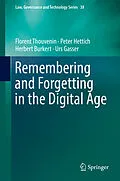This book examines the fundamental question of how legislators and other rule-makers should handle remembering and forgetting information (especially personally identifiable information) in the digital age. It encompasses such topics as data protection, collective memory, privacy and the right to be forgotten when considering data storage and deletion. The authors argue in support of maintaining the new digital default, that (personally identifiable) information should be remembered rather than forgotten.
The book offers guidelines for legislators as well as private and public organizations on how to make decisions on remembering and forgetting personally identifiable information in the digital age. It draws on three main perspectives: law, including the example of Swiss legal provisions; technology, specifically search engines, internet archives, social media and the mobile internet; and an interdisciplinary perspective from philosophy, the social sciences andarchiving science among other disciplines. Readers will benefit from a holistic view of the informational phenomenon of "remembering and forgetting".This book will appeal to economists, lawyers, philosophers, sociologists, historians, anthropologists, and psychologists among many others. Such wide appeal is due to its rich and interdisciplinary approach to the challenges for individuals and society at large with regard to this aspect of human experience in the digital age.
Autorentext
Prof. Dr. Florent Thouvenin is an Associate Professor of Information and Communications Law at the University of Zurich. He is the co-founder and co-chair of the Executive Committee of the Center for Information Technology, Society, and Law (ITSL) at the University of Zurich and the Executive Director of the Swiss Forum of Communication Law (SF-FS).
Inhalt
Part 1. Introduction.- Part 2. Legal Framework.- Storage Obligations.- Disposal Obligations.- Access Restrictions.- Prescription.- 3. Technological Developments.- Search Engines.- Social Media.- Internet Archives.- Mobile Internet.- 4. Interdisciplinary Perspectives.- FORGETTING In a Digital Glasshouse?; Christine Abbt.- Remembering prevails over Forgetting: Archiving of Personal Data in the Analog and in the Digital Age; Christoph Graf.- Digitalization and social identity formation A Sociological Point of View; Matthias Klemm.- The Digital Age and the Social Imaginary; Melinda Sebastian and Wesley Shumar.- On the economics of remembering and forgetting in the digital age; Mark Schelker.- A Political Economic Analysis of Transparency in a Digital World; Christine Benesch.- The Role of Temporal Construal in Online Privacy behaviours; Johannes Ullrich.- Remembering (to) Delete, Forgetting Beyond Informational Privacy; Viktor Mayer-Schönberger.- Longevity: Impact on Remembering and Forgetting; Domenico Salvati.- On the Interplay between Forgetting and Remembering; Nikos Akitas.- Part 5. Design Guide.
